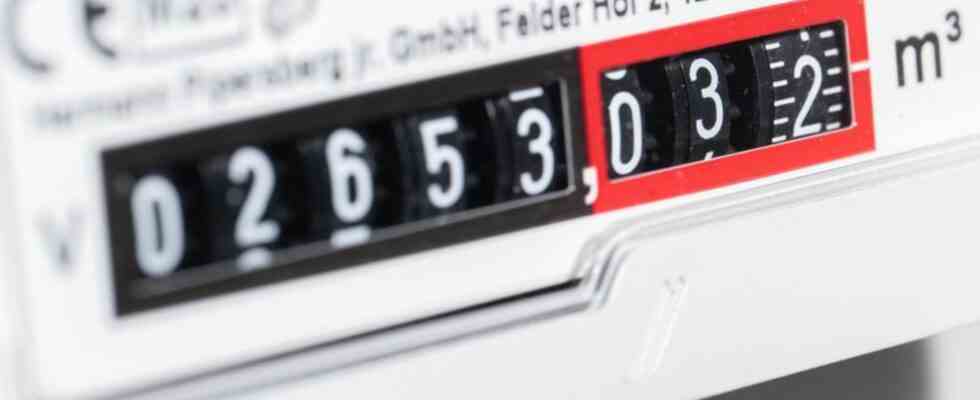The new gas levy will take effect from October, with VAT on top. The EU Commission makes proposals for relief. Economists call for direct payments, especially for the middle class.
Millions of households in Germany are likely to groan under the sharp rise in gas prices in autumn, also caused by the new gas levy. Economists warn that many cannot do it on their own. The pressure on the federal government is increasing to put together a new relief package as soon as possible. An overview of the situation and what suggestions there are:
Why VAT is due on the gas surcharge
The exemption from VAT for the planned gas levy that the federal government wanted is finally off the table. The current legal framework does not allow an exception for the surcharge, wrote EU Economic Commissioner Paolo Gentiloni in a letter to Federal Finance Minister Christian Lindner (FDP) on Wednesday.
The state gas surcharge applies from October. It is intended to protect gas suppliers who have to buy replacement gas from Russia at high prices for the lack of cheaper gas. Added to this is the fact that higher procurement costs are gradually reaching customers anyway.
The levy of around 2.4 cents per kilowatt hour means annual additional costs of around 144 euros for a one-person household with an annual consumption of 5000 kilowatt hours including VAT. For a family household with 20,000 kilowatt hours, the additional costs including VAT are around 576 euros.
What proposals the EU Commission is making
EU Commissioner Gentiloni suggested that the federal government could pay back the VAT to consumers afterwards. This could benefit households with low incomes in particular and thus compensate them for the surcharge itself. Second, energy companies could benefit from this, so that end customers would be relieved. Alternatively, one could reduce the applicable VAT to the EU minimum rate of five percent, wrote Gentiloni. After all, you could simply lower the levy. In Germany, a VAT rate of 19 percent usually applies, the reduced rate is 7 percent.
What economists and associations propose
Marcel Fratzscher, President of the German Institute for Economic Research, told the German Press Agency: “The best instrument is direct transfer payments such as energy money of 100 euros per person per month for the next 18 months.” However, this should only go to people with medium and low incomes and not to people with high incomes.
The scientific director of the Institute for Macroeconomics and Business Cycle Research of the Hans Böckler Foundation, Sebastian Dullien, said that a new edition of the energy flat rate would be conceivable and sensible. This can be paid in December. Households that have largely been left empty-handed so far, such as pensioners with low incomes but without housing benefit, should also be taken into account. “Another good option would be to introduce a gas price cap for basic consumption per household.”
The one-off energy flat rate of 300 euros decided by the federal government will come in September. The money is paid out with the salary, so taxes are also to be paid on it. The lump sum is part of the previous relief packages.
The municipal utility association VKU proposed lowering the value added tax for electricity, gas and heat supplies in general, to the reduced tax rate of 7 percent or even to 5 percent. In addition, the electricity tax could be reduced to the European minimum.
What the federal government has announced so far
Chancellor Olaf Scholz (SPD) has assured the citizens that no one will be left alone. So far he has announced a housing benefit reform with a significant increase in the number of beneficiaries, effective January 1, 2023. Citizen benefits are also to come on January 1, which are intended to replace the previous Hartz IV system.
Scholz said last week that the government also wants to do something for those who have an income from work but also have to do math, who have no savings and cannot easily deal with the increased energy costs. “That applies to a lot of citizens,” said the SPD politician. “I’m concerned with those who earn 2,800, 3,200 or 4,000 euros gross per month, for whom all of this is a big challenge.” It’s a total package.
What Scholz’s statements mean
Scholz’s plans went well into the middle, said Maximilian Stockhausen from the German Economic Institute. Because of the war-related price increases, especially for energy and food, relief for the “lower middle” in particular is just as appropriate as relief for the lower income brackets. Proposals to set up hardship funds are particularly useful because they enable individual and timely solutions.
Dullien said the income groups Scholz named correspond to the lower middle class in Germany. “In 2021, for example, the average gross salary of a full-time employee was just over 4,000 euros per month.” Fratzscher said the group named by Scholz has little savings to cover additional costs and receives little direct support from the state. Therefore, these people could not cover the costs of higher inflation on their own and urgently needed support. “Politicians must now urgently implement a third relief package, which will give top priority to relieving this group.”

